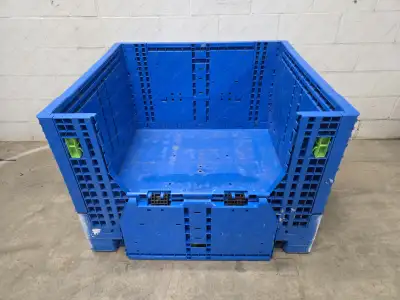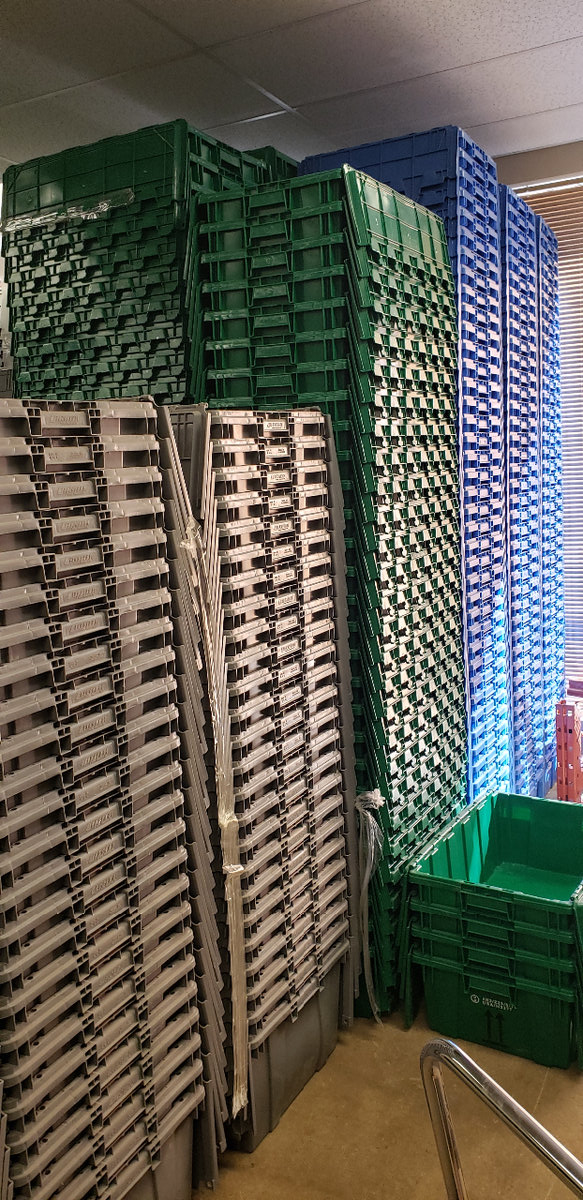The benefits of using used plastic containers for packaging and logistics
Why Mass Containers Are Vital for Economical and lasting Transport
Mass containers play a vital function in modern-day logistics. They facilitate the reliable activity of huge amounts of goods, thus enhancing transport processes. This method not only reduces costs but also minimizes ecological influence via reduced discharges and waste generation. As industries look for more lasting methods, the fostering of bulk containers is becoming increasingly substantial. What ramifications does this change hold for future logistics and supply chain monitoring?

The Benefits of Using Bulk Containers in Logistics
Mass containers revolutionize logistics by enhancing effectiveness and sustainability. These containers allow for the transport of huge amounts of goods in a single trip, substantially lowering the number of journeys required. This not just streamlines operations yet also decreases labor prices connected with handling, filling, and unloading. On top of that, mass containers are made to maximize space application within transport automobiles, making certain that even more items can be shipped concurrently.
The standardization of bulk containers also streamlines the logistics procedure. With uniform measurements, they can be conveniently piled and stored, causing improved storage facility monitoring. Bulk containers frequently feature durable materials that safeguard materials from damages during transit, therefore lowering item loss and enhancing total dependability. Therefore, services can experience boosted supply chain performance, inevitably bring about increased earnings and client contentment. This combination of variables makes bulk containers a vital property in contemporary logistics.
Environmental Effect: Reducing Waste and Carbon Footprint
As markets significantly prioritize sustainability, the fostering of bulk containers has arised as an essential approach for decreasing waste and lowering carbon impacts. These containers reduce making use of product packaging materials, such as boxes and plastic, consequently notably lowering general waste generation. By combining shipments, bulk containers boost transportation effectiveness, permitting for more products to be transferred per journey. This reduction in journeys directly associates with reduced greenhouse gas discharges, adding to a smaller carbon impact.
In addition, bulk containers can usually be reused or recycled, additionally mitigating environmental influence. The toughness of these containers guarantees they can endure several transportation cycles, lowering the need for single-use options. used plastic containers. By improving logistics and promoting efficient resource use, bulk containers not only support sustainable practices but likewise motivate markets to line up with global environmental objectives. Inevitably, their implementation mirrors a dedication to eco-friendly stewardship and liable source administration
Cost Financial Savings: Just How Bulk Containers Lower Transportation Expenditures
While lots of companies look for ways to boost their lower line, using bulk containers provides a considerable possibility for decreasing transport expenditures. Mass containers make the most of the quantity of products transported, enabling services to deliver bigger quantities at when. This effectiveness reduces the variety of journeys needed, directly lowering fuel costs and decreasing labor costs connected with loading and discharging.
Furthermore, bulk containers often feature structured designs that maximize room application within transportation vehicles. This indicates fewer voids, resulting in a lot more reliable use of offered ability. The durability of mass containers can lower the risk of item damages during transit, guaranteeing and minimizing losses that even more goods get here undamaged.
Enhancing Supply Chain Efficiency With Mass Storage Solutions
Bulk storage space remedies play an important duty in boosting supply chain efficiency by optimizing stock administration. By settling goods into less, larger containers, services can considerably reduce managing costs related to constant transfers and handling. This structured strategy allows for much better tracking and management of inventory, ultimately leading to improved functional efficiency.
Streamlined Stock Administration
Efficient inventory management is important for optimizing supply chain operations, especially when organizations embrace bulk storage space options. These solutions allow organizations to keep higher stock levels while decreasing the regularity of replenishment. By settling products into bulk containers, business can enhance their stock procedures, decreasing the intricacy connected with tracking numerous smaller sized packages. This technique helps with precise stock counts and enhances projecting accuracy, permitting more enlightened decision-making. On top of that, bulk storage solutions streamline storehouse organization, making it simpler to situate and gain access to products when needed. Consequently, companies can attain an extra effective stock turnover price, ultimately improving overall supply chain efficiency and reducing the probability of stockouts or overstock circumstances.

Lowered Handling Prices
The execution of mass storage services not just simplifies stock monitoring yet also substantially reduces managing costs across the supply chain. By settling products into bulk containers, business decrease the demand for regular handling and transfer between various storage and transportation systems. This strategy lowers labor prices linked with loading, unloading, and moving smaller sized plans. Furthermore, mass storage space reduces the frequency of shipments, causing reduced transport prices and lowered gas intake. Consequently, organizations can optimize their logistics procedures, enabling an extra effective allowance of sources. Eventually, decreased dealing with costs contribute to boosted general supply chain effectiveness, promoting an environment that sustains both sustainability and financial stability.

Convenience of Bulk Containers Throughout Numerous Industries
Several markets have unique demands for transport and storage, mass containers have actually emerged as a versatile service that fulfills a large range of demands. These containers, varying from large containers to specialized containers, can fit diverse products, consisting of powders, granules, and fluids. In the farming sector, bulk containers promote the transport of fertilizers and grains, while the food and drink sector uses them for active ingredients and ended up items. The chemical market counts on bulk containers for safely delivering dangerous products, making sure compliance with security policies. Furthermore, building companies gain from bulk containers for transferring aggregates and various other products. Their versatility reaches various settings of transport, consisting of ships, trains, and vehicles, boosting logistical performance. This adaptability not only improves operations across different fields however also advertises sustainability by minimizing packaging waste and maximizing room en route. Mass containers play an important duty in modern supply chain administration.
Future Trends in Mass Container Usage and Sustainability
The future of bulk container use is increasingly formed by cutting-edge materials development that improves sustainability. Furthermore, automation check this in logistics guarantees to enhance procedures, reducing waste and enhancing efficiency. Embracing round economic climate practices will better reinvent exactly how bulk containers are designed, used, and recycled, promoting an extra lasting transportation landscape.
Ingenious Materials Growth
As markets significantly prioritize sustainability, ingenious products growth in bulk containers becomes a significant consider enhancing environmentally friendly transportation options. Scientists and manufacturers are checking out eco-friendly plastics, recycled compounds, and lightweight metals to reduce ecological effect. These materials not only reduce waste yet additionally improve gas performance by reducing the general weight of containers. Additionally, improvements in wise materials, which can adapt to differing problems, improve the durability and functionality of mass containers. The combination of these ingenious products lines up with round economy principles, advertising reuse and recycling. As the need for lasting techniques expands, the growth of such products will certainly play a crucial function in forming the future of mass container usage in logistics and transportation.
Automation in Logistics
Considerable advancements in automation are positioned to change logistics and the application of mass containers, boosting sustainability in transport. Automated systems, consisting of drones and self-governing automobiles, are simplifying the movement of mass containers, decreasing the dependence on conventional fuel-powered transport. These technologies maximize directing and packing procedures, decreasing vacant miles and boosting gas effectiveness. Furthermore, automated inventory monitoring systems enhance monitoring and tracking of mass containers, ensuring far better resource allotment and decreased waste. The integration of the Net of Things (IoT) enables real-time data analysis, making it possible for positive decision-making that straightens with sustainability goals. As automation remains to progress, it is expected to drive further advancements wholesale container use, ultimately sustaining more sustainable logistics methods and reducing the environmental impact of transport.
Circular Economic Situation Practices
Advancements in automation are establishing the stage for an extra incorporated method to round economy methods in the domain name of bulk container use. As industries progressively embrace sustainability, bulk containers are being designed for longevity and reusability. This shift not just decreases waste yet additionally boosts resource efficiency. Business are embracing methods such as closed-loop systems, where made use of home containers are gathered, reconditioned, and reintroduced right into the supply chain. Additionally, wise modern technologies track container life cycles, assisting in far better management and minimizing ecological impact. The collaboration Home Page between makers, logistics carriers, and end-users is essential in developing requirements for lasting container use. used bulk containers. Future fads indicate a growing emphasis on materials that are recyclable and naturally degradable, additional enhancing the circular economic climate's concepts wholesale transport

Frequently Asked Concerns
What Products Are Bulk Containers Typically Made From?
Bulk containers are commonly built from sturdy materials such as high-density polyethylene, cardboard, light weight aluminum, and steel. These materials offer strength, flexibility, and defense, making them suitable for carrying different products in various markets effectively.
Exactly how Do I Select the Right Dimension Mass Container?
Picking the right size bulk container entails reviewing the volume of materials to be moved, considering taking care of equipment compatibility, and appraising storage area demands. Appropriate size assurances efficiency in transportation and lessens waste during shipment.
Are Bulk Containers Reusable or Recyclable?
Mass containers are often recyclable, developed for several journeys, enhancing sustainability. Numerous can likewise be recycled, depending on the products utilized. Picking recyclable choices further supports environmental goals and reduces waste in transport techniques.
What Safety And Security Rules Relate To Mass Container Transportation?
Safety laws for mass container transportation consist of conformity with the Department of Transportation standards, correct labeling of harmful materials, architectural honesty analyses, and adherence to weight restrictions to guarantee risk-free handling and prevent crashes during transportation.
How Can Organizations Shift to Using Bulk Containers Successfully?
Businesses can change to bulk containers by assessing existing logistics, training personnel on handling, purchasing appropriate equipment, enhancing supply management, and teaming up with suppliers to ensure compatibility and performance throughout the supply chain.
As industries progressively focus on sustainability, the adoption of bulk containers has actually arised as a crucial strategy for reducing waste and decreasing carbon impacts. By combining materials right into bulk containers, business can simplify their inventory processes, minimizing the intricacy linked with tracking multiple smaller bundles. As sectors increasingly focus on sustainability, ingenious materials advancement in mass containers emerges as a significant aspect in boosting environment-friendly transport options. Automated systems, including drones and independent lorries, are simplifying the movement of mass containers, reducing the reliance on traditional fuel-powered transport. Additionally, automated inventory management systems enhance monitoring and monitoring of bulk containers, making sure far better source allocation and decreased waste.